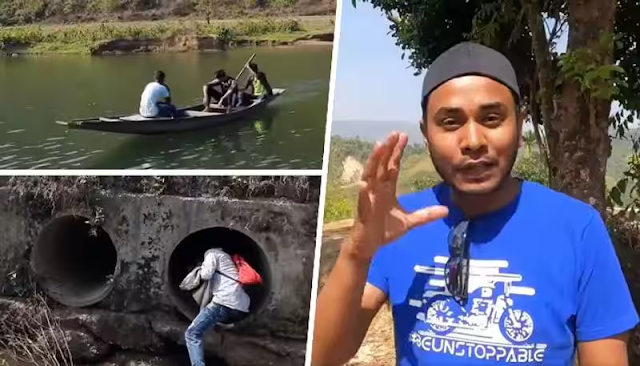Outrage Erupts Over Bangladeshi YouTuber's Video on Illegal Entry to India | Illegal Immigration | India
Illegal immigration from neighboring countries is a big issue in our country. Recently, a video of a Bangladeshi man sharing how to enter India illegally went viral on social media.
The man, a YouTuber named ‘DH Travelling Info,’ became famous after an old video of him explaining how to bypass security checks and enter India illegally started spreading on the Internet.
In the video, he claims that people don't need documentation, visas, or passports to enter India from Bangladesh. Filmed in the Sunamganj District of Bangladesh's Sylhet division, he shows it as a way to enter India. He points out a road leading to India and warns that those who take this route may face consequences from BSF officers. The video also shows the BSF camp in India and several tunnels that can be used to enter the country.
In the end, the man advises against illegal entry, saying people shouldn't damage Bangladesh's reputation. The video has gotten a lot of attention online, with over 200,000 views, 7,000 likes, and many comments on Instagram, with many people worried about the border issue.
Another user, Panchi, said, "No visas or passports are needed. Once they pass through the tunnel, PAN cards and Aadhar cards are easily available. Come, get them, and vote."
User Amir Raza Khan posted, "It's good that he exposed this route; now we can strengthen these spots."
Related Videos:
Bangladeshi YouTuber Guides Illegal Entry to India Using Underground Tunnels, Sparks Outrage
Also Read:
SC Asks Centre: What Steps Have Been Taken to Curb Illegal Migration into India?
The Supreme Court asked the Centre on Thursday about the steps taken to stop illegal migration into India.
A five-judge Constitution Bench of the top court heard petitions challenging the constitutional validity of Section 6A of the Citizenship Act, 1955, for the third day in a row.
"We want to know what the Centre is doing to safeguard the border and how much of the border is fenced. These are important questions in this case. The home secretary should also think about this," said Chief Justice of India (CJI) Dr. DY Chandrachud. The court set the next hearing for December 12.
The court also asked the Centre for a detailed report on how many people came to India from Bangladesh between 1967-1971 and what actions have been taken to make the border safer.
The court questioned why only Assam migrants were given citizenship and not those in West Bengal, which also shares a large border with Bangladesh.
Solicitor General (SG) Tushar Mehta, representing the Union government, said the Centre would file an affidavit with all the data.
The court asked the SG to report on how many foreigners were detected by the foreigners' tribunals, the number of illegal migrants in India (not just Assam), and the number of tribunals set up by the central government. The SG also needs to provide data on cases disposed of and pending before the Guwahati High Court.
The SG must file a common affidavit covering all these points by the central government and the state of Assam.
During the hearing, the SG said the amendment to Section 6A is specific and does not relate to other citizenship act amendments. He acknowledged the petitioners' concerns about illegal immigrants taking jobs and benefits but opposed declaring Section 6A unconstitutional. He argued that Section 6A was specifically meant for Assam and that quashing it wouldn't solve the problem.
The five-judge Constitution Bench, led by CJI Dr. DY Chandrachud and including Justices Surya Kant, M M Sundresh, J B Pardiwala, and Manoj Misra, will continue hearing arguments on Friday.
The Assam Sanmilita Mahasangha, a civil society organization from Guwahati, and other petitioners challenged Section 6A back in 2012.
Section 6A of the Citizenship Act, introduced to enforce the Assam Accord, sets the rules for recognizing or expelling migrants in Assam based on their migration date. It states that those who came to Assam between January 1, 1966, and March 25, 1971, from specified areas, including Bangladesh, must register for citizenship under section 18, fixing March 25, 1971, as the cut-off date for granting citizenship to Bangladeshi migrants in Assam.
Related Videos:
India Receives Formal Note from Bangladesh Over Mamata Banerjee's 'Shelter' Remarks
Related Link:



Comments
Post a Comment
Incase of any question pls reach out to us.